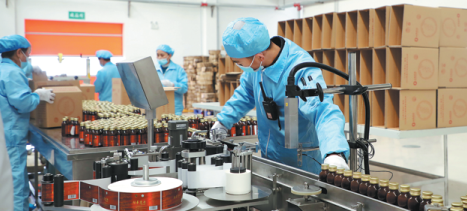Specialty produce raises incomes of rural workers
Updated: 2023-12-22

Workers package sea buckthorn beverages at a company in Kelan county. [Photo by Zhao Wenjun for China Daily]
Farmers in the northwestern Shanxi county of Kelan have enjoyed steady growth in revenue thanks to a transition from traditional farming to cultivating specialty produce.
According to Cui Yueping, head of the Kelan bureau of agriculture and rural affairs, the per capita net income of Kelan's farmers was 8,820 yuan ($1,236), 9,746 yuan and 10,457 yuan in 2020, 2021 and 2022, representing an increase of 9.9 percent, 10.5 percent and 7.3 percent.
He said that such growth momentum is a result of farming cashmere goat, kidney beans, morel mushrooms and sea buckthorn.
Kelan used to be a traditional agricultural economy with a focus on conventional crops such as wheat and corn. However, the county's hilly topography and scarce precipitation are not favorable for such crops. As a result, the county's authorities have been trying to convert the farming economy for a long time.
After much research and trials, they finally decided to cultivate farming operations based on four key types of produce in 2020, which proved to be the right choice for local farmers in the years to follow, according to Cui.
Lyuxiangyuan Ecological Agriculture is a company in Kelan engaged in the processing and sales of kidney bean products.
Lyu Jie, general manager of the company, said canned kidney bean products are popular in markets like Beijing and Shanghai.
"This is because of its rich content of protein and amino acids, which are helpful for the growth of children," the executive said.
Cui said that Kelan now has more than 6,600 hectares of land dedicated to kidney bean farming. The total sales volume of kidney bean products now reaches 15,000 metric tons a year, accounting for roughly one-third of the nation's total.
Ma Xiping is an official of Guanzhuang village in Kelan. He said a family in the village can garner revenue between 30,000 and 40,000 yuan from kidney bean farming, thanks to improvements in both output and quality as a result of breeding research by local agronomists.
"Several years ago, the per-hectare output of kidney beans was about 1,500 kilograms," Ma said. "But the output surpassed 3,000 kilos this year, thanks to the use of new seedlings."
Cashmere goats in Kelan are another example of local produce that is winning market popularity through the efforts of breeding researchers.
"In Kelan, researchers have developed a unique variety of goat, which features great market value in terms of down, fur, hide and meat," said Zhang Xianming, head of the animal husbandry center of Kelan county.
He said by raising the cashmere goats under the geographical indication of "Jinlan" – which literally means Kelan, Shanxi – the county is able to produce 3,000 tons of meat, 200,000 hides and 300-plus tons of cashmere annually.
In 2022, animal farming in Kelan generated a total output value of 460 million yuan, accounting for nearly half the total agricultural output value. The farming of cashmere goat yielded total revenue of 280 million yuan and contributed 26.2 percent of per capita disposable income to rural residents, according to Zhang.
Sea buckthorn, a native shrub that is used to curb desertification and soil erosion, is now yielding additional economic benefits in Kelan thanks to healthy food and beverages developed from its fruit and leaves.
Songjiagou Functional Food is a producer of sea buckthorn products in Kelan. Its sales of food and beverages based on the plant are expected to surpass 21 million yuan this year, according to Zhang Yanfeng, general manager of the company.
"We have signed purchase contracts with local farmers," Zhang Yanfeng said. "A farmer can earn revenue between 20,000 and 30,000 yuan by selling to us the sea buckthorn fruit and leaves."
The farming of morel mushrooms is an emerging industry in Kelan. It now has 68 greenhouses for their cultivation. The average net profit generated from a greenhouse is nearly 80,000 yuan a year, according to a local official.
Wang Liqiang contributed to this story.



